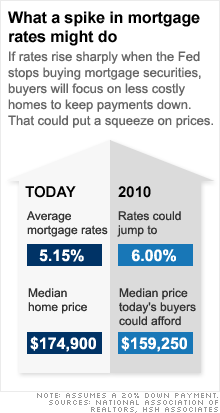Make money in 2010: Your home
Prices should stabilize at last, but rebuilding your equity will take time.
(Money Magazine) -- After three years of slumping house prices, the end of the real estate bust may finally be in sight. Home sales are rising, inventories are shrinking, and most economists believe values nationwide will hit bottom in the second half of the year -- but not before falling another 5% to 10% first.
Prices after that should stay mostly flat until 2012. "Next year will clearly be better than this year," says Mike Larson, a real estate analyst at Weiss Research. "Prices may drop a little more, but the lion's share of the damage is behind us."
One positive byproduct of the 30% plunge in prices since the 2006 peak: Houses are now more affordable than at any time in the past two decades, according to the National Association of Home Builders -- good news for anyone looking to buy.
Then too, mortgage rates, now at 5.15%, should stay low for the first few months, thanks in part to the Federal Reserve's ongoing purchase of mortgage-backed securities. But if the economy really picks up steam and inflation fears resurface in the second half of the year, rates could rise as high as 5.25% to 6.5%.
If you hope to sell your home or rebuild lost equity, there's new hope. One plus is that Congress has recently extended the first-time homebuyer credit, and even expanded it to include those with higher incomes and current homeowners.
But with layoffs high, defaults should remain problematic, hitting wealthy areas even harder next year, says Joshua Shapiro, chief U.S. economist at MFR, a consulting firm. In fact, 30% of recent foreclosures were on higher-priced homes -- nearly double the 2006 rate.
Wild card: If the Fed stops buying mortgage securities in March as planned and private investors don't step up, rates could spike to 6% or higher sooner and faster than expected, slowing demand and pushing prices down.
Signs to watch: Steady growth in single-family housing permits (track it at census.gov) indicates that builders believe buyers are returning to the market.
Buyers: Make your move now. Have you been on the sidelines waiting for prices to go lower before house shopping and bidding in earnest? Don't hold off much longer.
"The market will remain tilted in favor of the buyer over the next year, but that power will gradually be reduced as conditions in the housing market improve," says Larson at Weiss Research. You'll have plenty of homes to choose from as foreclosures continue to pile up and more homeowners list their houses in an improving market. Be sure to keep a close eye on mortgage rates. If they rise sharply as the Fed's mortgage buyback program draws to a close, act quickly to lock in a low fixed rate.
Anyone looking to buy or invest in a lower-priced, entry-level home should expect competition. Put down as much cash as possible (many investors are offering to make all-cash deals); come in below the listing price and there's a good chance you'll lose to another bidder.
But demand is much softer for middle- to top-tier homes, particularly those priced above $500,000. The supply is greater too, so you'll be in a stronger bargaining position. Offer at least 10% below what comparable homes have sold for lately (your realtor can supply this info). That way you won't take a hit if prices of higher-end homes fall another 10% or more, which is very likely, Shapiro says.
Sellers: Postpone listing your home, if possible. Sellers next year will be unloading property at what's likely to be the very bottom. Ouch. Hold out for a few more years, so you'll compete against fewer foreclosures, increasing the chances your home will fetch a higher price.
Delaying your sale isn't an option? Act fast before prices drop further. To expedite a sale, don't try to compete on price with foreclosures and short sales (when the bank allows owners to sell for less than they owe on their mortgage); most of the time, you can't win. Instead play up your home's strengths. Foreclosures typically need a lot of work, and short sales can take months. So make necessary repairs, throw in a paint job and new carpeting since buyers may be short on cash after the down payment, and offer a fast and flexible closing date. That will attract people willing to pay more for a home that's in move-in condition and a deal they can close quickly.
Owners: Look into refinancing, and rein in spending on home improvements. You're a prime candidate for refinancing if you have an adjustable-rate mortgage and will be in your home for at least five years. There's no reason to wait; you won't get a better deal than you will now.
As for fixing up the place, now's not the time to spend serious money; since prices aren't likely to snap back soon, you won't see much of a return on your investment. Focus on lower-cost cosmetic fixes, like painting and landscaping, and basic projects that improve functionality and design, such as adding molding or doing a basic bathroom remodel.
Make money in 2010: The economy
Make money in 2010: Your job
Make money in 2010: Your savings and credit
Make money in 2010: Your investments ![]()




